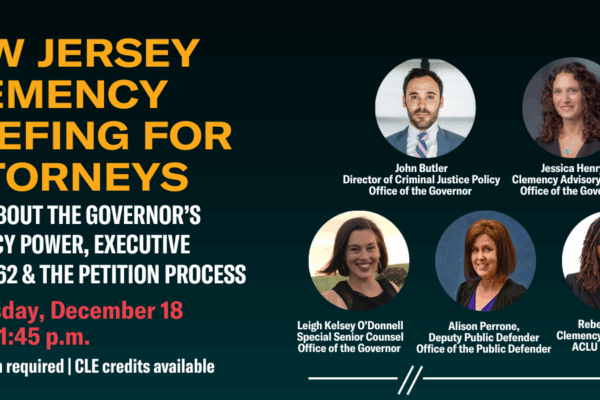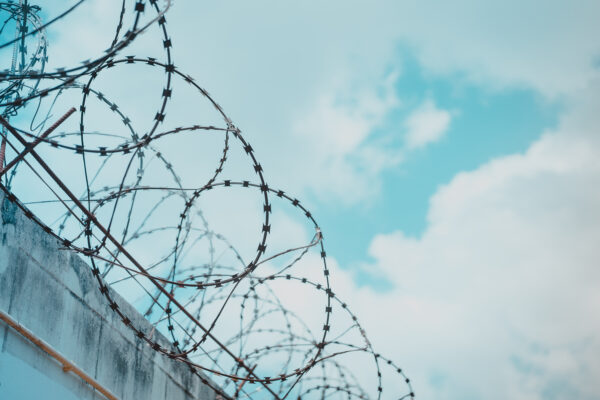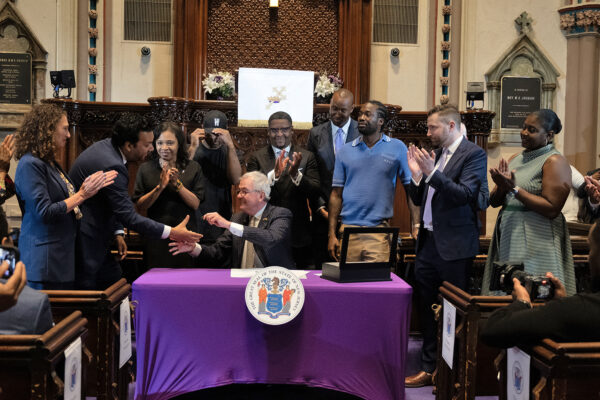

The Clemency Project
Get Involved
By completing this form, I agree to receive occasional emails per the terms of the ACLU’s privacy statement.
Last updated on August 06, 2025
The Clemency Project
The ACLU of New Jersey has launched The Clemency Project as an integral part of a larger decarcerative vision that centers racial and social justice – and reimagines the criminal legal system as we know it.
The ACLU of New Jersey has launched The Clemency Project as an integral part of a larger decarcerative vision that centers racial and social justice – and reimagines the criminal legal system as we know it.
Clemency means more than mercy – it’s a measure to mitigate injustice
The ACLU-NJ has dedicated decades working toward reducing the state’s incarcerated population – victories in the courtroom and in the Legislature have contributed to New Jersey’s historic reduction in its prison population by more than 50 percent since 2011. But to begin to repair the harms of mass incarceration, all branches of government need to be involved. New Jersey must adopt a holistic approach to decarceration – and it must include governors leveraging categorical clemency.
An expansion to offering pardons and commutations, categorical clemency allows a governor or president to examine holistic injustices that have impacted groups of people and consider relief for each person within the identified class. It’s an important check and balance on the criminal legal system – and it’s one that has existed since our nation’s founding as a tool to more fully administer justice.
That’s why we launched The Clemency Project: because reviewing extreme sentences must be the expectation, not the exception; because adopting a comprehensive decarcerative vision is foundational for a fairer future; and because releasing people from prison is fundamental to racial justice in New Jersey and beyond.
Centering racial justice and expanding New Jersey’s decarcerative progress
New Jersey has provided a national model for decarceration by implementing innovative policy reforms spearheaded by the ACLU-NJ, from eliminating cash bail, to legalizing marijuana for adult use, to enacting Public Health Emergency Credits that secured the release of thousands during the pandemic and saving countless lives in the process.
But New Jersey still has the highest rate of racial disparities in its prison population in the nation – and too many people are serving extreme sentences that are not commensurate with their crime or culpability.
This reality is a result of a criminal legal system that has deep roots in white supremacy, but redress rarely occurs. Between 1994 and 2022, only 105 people received clemency in New Jersey – a failure to sufficiently leverage clemency as a tool that is widely supported by the public to confront these past and present harms.
As part of The Clemency Project, ACLU-NJ attorneys have identified systemic injustices and harsh sentences that have impacted groups of incarcerated people, including survivors of domestic violence and those who are serving sentences impacted by extreme trial penalties – a reference to people who are serving significantly longer sentences because they opted to exercise their constitutional right to a trial rather than agreeing to the prosecutor’s plea offers.
To ensure New Jersey will leverage the power of clemency to its fullest potential, we’ve met with incarcerated people, reviewed case files, and authored petitions for release for those with lived experience in the identified categories. As he approaches the end of his second and final term, Governor Murphy has an opportunity to begin addressing the harms of an unjust criminal legal system – and there is no time to lose, because building an equitable future means addressing injustice now.
The Clemency Project will continue laying groundwork for wholesale change
We built The Clemency Project to move New Jersey toward our vision of a fair and equitable state for all who call it home. We must continue to decarcerate at every opportunity and at every scale – and we know leveraging categorical clemency is an important part of reimagining the criminal legal system as we know it.
Related Issues
Related Content

- Decarceration|
- +1 Issue
Championing Clemency in New Jersey: A Briefing for Attorneys

- Decarceration|
- +2 Issues
Extreme Trial Penalties Are Deeply Unjust – Categorical Clemency Can Bring Justice

- Decarceration|
- +2 Issues
Governors Are Sitting on a Critical Tool to Reduce Incarceration and Uplift Communities

- Decarceration|
- +2 Issues
